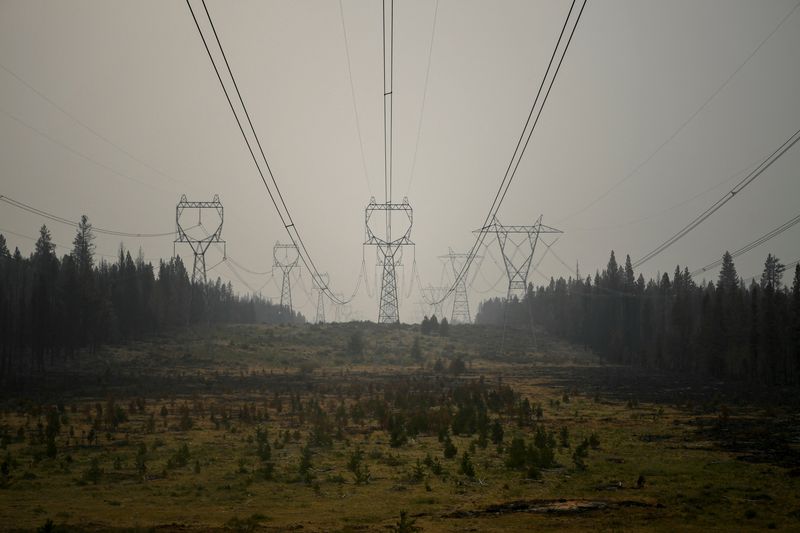Stock Markets
Analysis-Warren Buffett’s PacifiCorp utility singed by wildfires

By Jonathan Stempel
OMAHA, Nebraska (Reuters) – Two years ago, Warren Buffett branded Berkshire Hathaway (NYSE:)’s energy business one of his conglomerate’s four “giants.” Now he fears its business model may be broken.
Berkshire Hathaway Energy’s PacifiCorp unit faces billions of dollars in potential liabilities from wildfires that have scorched hundreds of thousands of acres in southern Oregon and northern California.
Costs could rise as more fires break out, and from efforts to prevent them. Climate change, reflected in drier and hotter weather and more combustible vegetation, adds to the risks.
“I did not anticipate or even consider the adverse developments in regulatory returns,” Buffett wrote in his annual shareholder letter in February. “I made a costly mistake in not doing so.”
What remains unclear is the extent PacifiCorp’s problems drag on the conglomerate’s overall results, with Berkshire’s deep balance sheet and dozens of other operations being unable to totally counteract.
Buffett, 93, and his designated successor Greg Abel, 61, may face shareholder questions at Berkshire’s May 4 annual meeting in Omaha, Nebraska, about their concerns for the energy company.
“Wildfires make (the utilities) fire insurance companies on top of being utilities,” said Steven Check, who oversees $1.9 billion at Check Capital management, including $600 million in Berkshire stock and options. “It is a material change. Warren Buffett did not see this coming at all.”
ESCALATING CLAIMS
Berkshire Hathaway Energy serves about 5.3 million electric and gas customers through PacifiCorp, MidAmerican Energy and NV Energy in 11 western and Midwestern states, and millions more in England and Alberta, Canada.
remove ads
.
It owns 36,400 miles (58,580 km) of electric transmission lines, and operates 21,000 miles of pipelines.
For many years, Berkshire Hathaway Energy – which is 92% owned by Berkshire Hathaway – had been a steady earnings engine for its parent, typically generating 10% to 12% of overall operating profit.
That fell to just 6% in 2023, as the business’s profit slid 40% to $2.33 billion.
PacifiCorp was a big reason. Jurors have found the Portland, Oregon-based utility liable in several verdicts over wildfires from 2020, blaming losses on its power lines. PacifiCorp has denied negligence.
But it ended 2023 with $2.4 billion of projected wildfire losses, and has said losses could grow to $8 billion.
This week, a group of 1,000 fire victims said PacifiCorp should pay them $30 billion.
One result: PacifiCorp will pay no dividends to Berkshire Hathaway Energy for several years, which could affect the parent’s ability to fund operations.
“It’s key for utilities to recover costs and maintain a strong financial profile so they can ensure reliability for customers,” said Travis Miller, a Morningstar stock analyst.
Utilities can reduce the risk of wildfires by insulating wires to reduce the threat of sparks, trimming or cutting down trees that could contact power equipment, burying transmission lines underground, and temporarily shutting off power.
But mitigation can be expensive, and Buffett pledged that Berkshire “will not knowingly throw good money after bad.”
Toby Shea, senior credit officer at Moody’s (NYSE:) Investors Service, explained: “He’s saying, look, if we basically have to pay out billions and billions of dollars every time there is a big fire, this is not a workable model.”
remove ads
.
BLAME THE LAWYERS This is not the first time Berkshire has encountered big headwinds in a major business.
Berkshire spent years cleaning up poor underwriting at General Re after paying $16 billion for the reinsurer in 1998.
It also overpaid for Precision Castparts, which cost $32.1 billion in 2016, only to see its aircraft parts business collapse during the pandemic. Litigation involving PacifiCorp could drag out for years, and the ultimate cost and timing of payouts are uncertain.
In his shareholder letter, Buffett warned that a “confiscatory resolution” might befall PacifiCorp, but that Berkshire and Berkshire Hathaway Energy were structured to survive it.
Though analysts do not foresee a bankruptcy, Berkshire could decide it might not be worth investing in generating and transmission assets if it were forced to foot several years of big legal bills.
“Our assumption is that if damages at PacifiCorp become unsustainable long term, the company’s support toward PacifiCorp could be limited,” S&P Global analyst Sloan Millman said.
Berkshire Hathaway Energy declined to comment for this article.
PacifiCorp said the $30 billion claim shows the need for legal reform, with its ability to serve customers “threatened by excessive wildfire damages pursued by plaintiffs’ attorneys who have a substantial financial stake in these outcomes.”
Some states are addressing utilities’ risk of bankruptcy from wildfires.
In 2019, California lawmakers created a multibillion-dollar wildfire fund that utilities could tap to pay for damages caused by their equipment.
And in March 2024, Utah lawmakers allowed large utilities to collect surcharges from customers to establish wildfire funds, and capped liability on some claims.
remove ads
.
PacifiCorp could benefit if Oregon took similar steps. For now, Berkshire’s size offers protection from big losses.
Paul Lountzis, president of Lountzis Asset Management in Wyomissing, Pennsylvania, which invests 11% of its assets in Berkshire stock, said diversification “really, really helps. It’s not like Berkshire is one singular utility.”
Stock Markets
Rithm Capital stock target raised on growth prospects

On Friday, Argus increased its stock price target on Rithm Capital Corp. (NYSE: RITM) to $13.00, up from the previous $12.00, while reaffirming its Buy rating on the stock. The firm highlighted the company’s ongoing transformation and expansion efforts as the rationale behind the revised target price.
Rithm Capital, which rebranded from New Residential Investment Corp. in August 2022, has since transitioned to internal management after previously being managed by Fortress Investment Group. This change is part of a broader transformation of the company’s business model initiated following the financial crisis in late March 2020.
The company has been actively growing its mortgage servicing operations and seizing new debt-related investment opportunities. In its expansion efforts, Rithm Capital has acquired a 50% interest in GreenBarn Investment Group, a commercial real estate equity and debt investment management firm.
Further bolstering its portfolio, Rithm Capital has also made significant acquisitions, including purchasing $1.4 billion worth of Marcus consumer loans from Goldman Sachs for $145 million. Moreover, the company has completed the acquisition of Computershare Mortgage Services Inc. and its affiliates, including Specialized Loan Servicing LLC (SLS), for an approximate total of $720 million.
Completing its notable transactions, Rithm Capital finalized the acquisition of the $33 billion alternative asset manager Sculptor Capital Management (NYSE:) in the fourth quarter of 2023. These strategic moves have contributed to the firm’s positive outlook on Rithm Capital’s stock and its increased price target.
InvestingPro Insights
In light of Argus’s stock recent price target increase for Rithm Capital Corp. (NYSE: RITM), InvestingPro data further supports the optimistic outlook. Rithm Capital’s market capitalization stands at a robust $5.55 billion, while maintaining an attractive P/E ratio of 7.41, indicating that the stock may be undervalued relative to its earnings.
remove ads
.
The company’s significant dividend yield of 8.73% as of the last recorded date, coupled with a history of maintaining dividend payments for 12 consecutive years, reflects a strong commitment to shareholder returns.
InvestingPro Tips suggest that while analysts have revised earnings downwards for the upcoming period, the company’s stock price movements have been quite volatile, trading near its 52-week high. This could present opportunities for investors looking for value plays with substantial dividend income.
Moreover, with a notable year-to-date price total return of 9.73%, and an impressive 55.73% return over the last year, Rithm Capital’s performance has been strong. For those seeking more in-depth analysis, there are additional InvestingPro Tips available at https://www.investing.com/pro/RITM, offering insights that could help investors make more informed decisions.
Use the exclusive coupon code PRONEWS24 to receive an additional 10% off a yearly or biyearly Pro and Pro+ subscription, unlocking even more valuable insights to guide your investment strategy.
This article was generated with the support of AI and reviewed by an editor. For more information see our T&C.
Stock Markets
JPMorgan maintains overweight on CK Infrastructure, steady HK$50 target

On Friday, JPMorgan upheld its Overweight rating on CK Infrastructure Holdings (1038:HK) (OTC: CKISY) with a consistent price target of HK$50.00. The firm’s analysis was based on a review of the company’s financial year 2023 results and current operating trends. Adjustments were made to the earnings forecasts for the years 2024 and 2025, with a slight reduction for 2024 by 2% and an increase for 2025 by 2%. These revisions take into account the influence of regulatory changes, inflation, and fluctuating exchange rates on the company’s regulated assets, particularly in the United Kingdom, Australia, and other regions.
The updated model reflects the latest developments and anticipates the potential financial impact on CK Infrastructure. The firm has decided to roll forward its price target to June 2025, while maintaining the previous target of HK$50. The Overweight rating suggests that JPMorgan continues to view the stock favorably in comparison to the sector average.
CK Infrastructure Holdings, which operates a diversified portfolio of infrastructure businesses, has been assessed for its performance and outlook in light of various external factors. The company’s exposure to regulatory resets and economic conditions in different geographies necessitates a nuanced understanding of its earnings potential.
The revised earnings estimates are a direct result of the firm’s comprehensive evaluation of the company’s regulated assets. These assets, which are subject to oversight by regulatory bodies, can be affected by policy changes and economic shifts, such as inflation and currency exchange rates.
JPMorgan’s reaffirmation of the Overweight rating indicates confidence in CK Infrastructure’s ability to navigate the complexities of its operating environment. The price target of HK$50 remains unchanged, signaling the firm’s belief in the company’s value proposition and its prospects for the future.
remove ads
.
This article was generated with the support of AI and reviewed by an editor. For more information see our T&C.
Stock Markets
Ashland shares target raised on improving demand

On Friday, Argus maintained a Buy rating on Ashland Inc . (NYSE: NYSE:) and increased the stock’s price target to $118 from $109. This adjustment suggests a potential total return of approximately 21%, including dividends, based on the current share prices.
The specialty chemicals and additives provider has experienced underwhelming operational and financial performance over recent quarters, including the second quarter of 2024. This was attributed to slower economic growth in key regions such as China, Europe, and parts of Asia. These areas faced challenges due to soft customer demand and ongoing inventory destocking by suppliers, which adversely affected Ashland’s revenue and profit margins.
Despite these challenges, there have been positive signs in the last quarter indicating a shift in market conditions. Ashland’s management has reported a gradual increase in demand across most of the company’s end markets.
According to Argus, this improvement is a result of the destocking cycle nearing its end and customer demand beginning to rise, which are seen as favorable trends for Ashland’s future growth.
The revised stock price target reflects the analyst’s confidence in Ashland’s recovery trajectory as the market dynamics that previously hindered the company’s performance are starting to reverse. The upward revision in the price target is based on the expectation of a continued recovery in customer demand patterns and the conclusion of inventory destocking.
Investors and market watchers will be monitoring Ashland’s progress closely, as the company aims to capitalize on the improving demand in its various markets and work towards delivering value to its shareholders.
remove ads
.
InvestingPro Insights
As Argus maintains a positive outlook on Ashland Inc. (NYSE: ASH), highlighting the potential for a 21% total return, InvestingPro data provides additional insights into the company’s financial health and market performance.
Ashland’s management’s aggressive share buyback strategy and a high shareholder yield are noteworthy, as noted by InvestingPro Tips. Furthermore, the company’s consistent dividend growth, with dividends raised for five consecutive years and maintained for 54 years, underscores its commitment to shareholder returns.
From a market perspective, Ashland’s stock is trading near its 52-week high, with analysts predicting profitability for the year. The company’s strong liquidity position, with liquid assets surpassing short-term obligations, is reassuring for investors.
Key financial metrics include a market capitalization of $4.98 billion, a P/E ratio of 26.25, and a dividend yield of 1.64%. Despite a decline in revenue growth over the last twelve months, the stock has experienced a significant price uptick, with a 29.41% total return over the last six months.
For those considering a deeper analysis of Ashland, InvestingPro offers additional insights. There are currently 11 more InvestingPro Tips available for Ashland Inc., which can be accessed by visiting https://www.investing.com/pro/ASH. To enhance your investing strategy with these insights, use coupon code PRONEWS24 to get an additional 10% off a yearly or biyearly Pro and Pro+ subscription.
This article was generated with the support of AI and reviewed by an editor. For more information see our T&C.

 Forex2 years ago
Forex2 years agoForex Today: the dollar is gaining strength amid gloomy sentiment at the start of the Fed’s week

 Forex2 years ago
Forex2 years agoHow is the Australian dollar doing today?

 Forex1 year ago
Forex1 year agoUnbiased review of Pocket Option broker

 Forex2 years ago
Forex2 years agoDollar to pound sterling exchange rate today: Pound plummeted to its lowest since 1985

 Cryptocurrency2 years ago
Cryptocurrency2 years agoWhat happened in the crypto market – current events today

 World2 years ago
World2 years agoWhy are modern video games an art form?

 Stock Markets2 years ago
Stock Markets2 years agoMorgan Stanley: bear market rally to continue

 Economy2 years ago
Economy2 years agoCrude oil tankers double in price due to EU anti-Russian sanctions

































